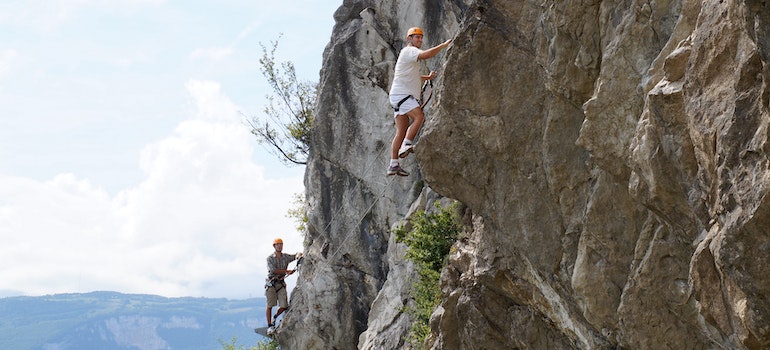Wilderness therapy for addiction treatment in West Virginia is a unique and innovative approach to addiction treatment. In fact, it has gained significant recognition in recent years for its effectiveness in addressing substance abuse and related mental health issues. This treatment method takes individuals into the heart of nature. Moreover, it utilizes the wilderness as a transformative backdrop for healing and personal growth. Unlike traditional therapy settings, wilderness therapy immerses participants in the natural environment, fostering self-discovery, resilience, and self-reliance. Guided by skilled therapists and outdoor experts, participants engage in challenging activities designed to promote self-reflection and emotional catharsis. These activities often include hiking, rock climbing, and camping. Harmony Ridge explores the principles of wilderness therapy, its role in addiction treatment, and its unique contribution to the recovery journey of those seeking a transformative path in West Virginia’s picturesque and rugged landscapes.
Benefits of Wilderness Therapy for Addiction Treatment in West Virginia
Wilderness therapy, as an unconventional yet effective approach to addiction treatment, offers a range of benefits that go beyond traditional methods. The three key benefits of wilderness therapy for addiction treatment are:
- Connection with nature
- Self-reflection and personal growth
- Experiential learning and skill development
Each of these benefits highlights the distinctive impact of wilderness therapy on individuals seeking recovery in the picturesque landscapes of West Virginia.
Connection with Nature
Nature has an innate ability to soothe the human spirit, and wilderness therapy capitalizes on this intrinsic therapeutic relationship between individuals and the great outdoors. The serene and unspoiled wilderness of West Virginia becomes a therapeutic canvas, offering participants a chance to escape the chaos of urban life and reconnect with their true selves forever.

Studies have shown that spending time in nature can reduce stress, anxiety, and depression while promoting a sense of calm and well-being. In this case, the wilderness serves as a catalyst for introspection and contemplation. It also fosters emotional healing and restores a sense of balance. Through this profound connection with nature, individuals begin to appreciate the simplicity and beauty of life.
Self-Reflection and Personal Growth
Central to the success of wilderness therapy is the emphasis on self-reflection and personal growth. Removed from the distractions of technology and everyday responsibilities, participants have the opportunity to engage in deep introspection without reservation. Hence, they are able to confront the underlying issues contributing to their addiction.
This type of addiction treatment is not only suitable for older adults but also for young adults and teenagers struggling with substance abuse. Guided by experienced therapists at drug rehab for young adults and supported by a group of peers facing similar challenges, you can process your emotions, traumas, and self-destructive patterns in a safe and nurturing environment. Because you must navigate through the trials and triumphs of the wilderness, you develop resilience and a renewed sense of self-worth. All of that helps you stay on the path to recovery.
Experiential Learning and Skill Development
In the wilderness, every moment presents a unique set of challenges that demand creativity and adaptability to overcome. In nature, participants engage in activities like wilderness survival, rock climbing, and navigating through rough terrains. Thus, they contribute to fostering problem-solving skills and self-reliance.

Moreover, the group setting promotes teamwork and effective communication. You must collaborate with others to achieve shared goals and support one another in your quests for growth and healing.
Therapeutic Approaches in Wilderness Therapy for Addiction Treatment in West Virginia
Wilderness therapy offers a multifaceted approach to addiction treatment within the captivating landscapes of West Virginia’s wilderness. Different approaches to wilderness therapy for addiction treatment include:
- Adventure-based therapy
- Group therapy and peer support
- Individual counseling
Adventure-Based Therapy
At the core of wilderness therapy’s effectiveness lies Adventure-Based Therapy (ABT). It is a powerful therapeutic approach that employs outdoor activities to facilitate personal growth and emotional healing. Through challenging and adrenaline-pumping adventures, such as rock climbing, white-water rafting, and zip-lining, participants are confronted with fear and uncertainty. That encourages them to step out of their comfort zones and embrace new experiences. ABT creates opportunities for individuals to build confidence, trust, and self-efficacy simultaneously. They conquer obstacles and achieve goals in the wilderness. This immersive and hands-on approach fosters increased self-awareness, improved problem-solving skills, and enhanced emotional regulation, all of which are integral to the recovery process.
Group Therapy and Peer Support
The power of human connection is used in wilderness therapy through group therapy and peer support. Participants come together as a close-knit community, sharing their struggles, triumphs, and vulnerabilities within the therapeutic setting of the wilderness. Guided by skilled therapists, group therapy for addiction encourages open communication and authentic self-expression, enabling individuals to gain insights into their addiction, relationships, and behavioral patterns.

As participants engage in shared experiences, they form deep bonds, providing mutual encouragement and motivation to sustain their recovery efforts beyond the wilderness.
Individual Counseling and Therapeutic Modalities
Complementing adventure-based activities, individual therapy, and various therapeutic modalities play a crucial role in wilderness therapy’s comprehensive approach. Experienced counselors work one-on-one with participants, tailoring treatment plans to address their specific needs and circumstances. Among the evidence-based modalities used to facilitate emotional growth and behavioral change are:
- Cognitive-Behavioral Therapy (CBT)
- Dialectical Behavior Therapy (DBT)
- Motivational Interviewing (MI)
The wilderness environment serves as a backdrop for self-reflection during these sessions, enhancing the therapeutic process. Participants gain valuable insights into the root causes of their addiction. It also helps them develop coping strategies and set personalized goals for their recovery journey. Individual therapy for addiction in WV provides a safe space for participants to explore their emotions, traumas, and personal histories, allowing them to heal and progress toward a healthier and more fulfilling life.
West Virginia’s Wilderness Therapy Haven
West Virginia, with its abundant natural beauty and diverse terrain, stands as an ideal destination for wilderness therapy. The state’s vast wilderness areas, encompassing dense forests, rolling hills, and winding rivers, provide a breathtaking setting for participants to embark on their journey of healing and self-discovery.

From the serene tranquility of the Monongahela National Forest to the rugged adventures offered by the New River Gorge, West Virginia’s diverse landscapes provide a wide array of therapeutic settings for outdoor activities and introspection.
Empirical Research and Studies on the Effectiveness of Wilderness Therapy for Addiction Treatment
Numerous empirical research studies have delved into the efficacy of wilderness therapy as a viable intervention for addiction treatment. One compelling study published in the Journal of Substance Abuse Treatment found that participants who underwent wilderness therapy exhibited significant improvements in substance use outcomes, mental health indicators, and overall well-being. The immersive nature of the wilderness experience fostered a deeper sense of self-awareness and personal growth among the participants. Moreover, the study highlighted the positive impact of group dynamics and peer support.

Further supporting the effectiveness of wilderness therapy for addiction treatment, a meta-analysis conducted by renowned researchers revealed consistent positive outcomes across multiple studies. The analysis demonstrated that wilderness therapy significantly reduced substance abuse relapse rates. It also enhanced participants’ psychological functioning compared to traditional treatment approaches.
Firstly, these findings reinforce the validity of wilderness therapy as an addiction treatment option. Secondly, they emphasize the importance of integrating nature-based interventions into drug and alcohol rehab in West Virginia for individuals seeking healing in the enchanting landscapes of WV.
Integrating Wilderness Therapy for Addiction Treatment in West Virginia with Traditional Treatment Modalities
The seamless integration of wilderness therapy with traditional treatment modalities offers a compelling and holistic approach to addiction treatment in West Virginia. Here is how:
- Complementing Evidence-Based Approaches: Wilderness therapy is not intended to replace conventional treatment modalities but to complement and enhance their effectiveness. The insights gained through wilderness experiences can be effectively applied in traditional therapy settings, reinforcing personal growth and coping strategies.
- Step-Down Continuum of Care: While participants progress from intensive residential programs to outpatient treatment or aftercare, wilderness therapy offers a bridge between structured environments and real-life challenges. This gradual transition provides individuals with ongoing support and skill-building opportunities.
- Strengthening Relapse Prevention: The wilderness environment presents real-world challenges and triggers. Therefore, it allows participants to practice coping skills in a controlled yet authentic setting. Therapists can address relapse triggers directly during wilderness experiences, equipping individuals with coping strategies to maintain sobriety in challenging situations.
- Family Involvement and Healing: Addiction impacts not only the individual but also their family and support network. Wilderness therapy programs often include family therapy for addiction, providing opportunities for healing and improved communication among family members. Engaging in outdoor activities together fosters understanding and empathy and strengthens family bonds.
- Holistic Healing: Integrating wilderness therapy with traditional modalities embraces holistic therapy for addiction treatment. Addressing the mind, body, and spirit, this comprehensive method recognizes the interconnectedness of mental, emotional, and physical well-being.
By combining evidence-based practices with the transformative experiences of the wilderness, individuals in West Virginia who go to rehab can benefit from a comprehensive and personalized treatment plan that fosters lasting healing and empowerment.
Limitations and Considerations for Wilderness Therapy for Addiction Treatment
While wilderness therapy shows great promise as an effective approach for addiction treatment in West Virginia, it is essential to address potential limitations, ethical considerations, and the significance of ongoing evaluation and research to ensure its efficacy and safety.
As with any treatment approach, wilderness therapy comes with its share of potential limitations and challenges that require careful consideration. Two of the major concerns are:
- Environmental Risks and Safety Concerns: Unpredictable weather conditions, encounters with wildlife, and remote locations necessitate stringent safety protocols and risk management to ensure participants’ well-being throughout the therapeutic journey.
- Limited Accessibility and Inclusivity: Some individuals seeking addiction treatment may face challenges due to physical limitations or a lack of resources to access wilderness therapy programs. Addressing these limitations requires thoughtful program design and an emphasis on inclusivity to ensure this transformative therapy is available to diverse populations seeking recovery.
Despite these challenges, wilderness therapy’s transformative potential remains undeniable, inspiring a compassionate and holistic approach to make recovery accessible to all who seek healing amidst nature’s embrace.
Ethical Considerations, Safety Protocols, and Appropriate Client Selection
Ethical considerations are paramount in wilderness therapy for addiction treatment in West Virginia, where participants are engaged in unique and potentially challenging experiences. Informed consent and client autonomy are fundamental, as participants must fully understand the program’s nature, associated risks, and potential benefits before enrolling. Therapists and program organizers must also uphold the ethical use of the wilderness environment, practicing sustainable and environmentally responsible methods to preserve these natural settings for future generations.

Not all individuals may be ready to face the physical and emotional demands of the wilderness setting. It requires careful assessment and screening to ensure the safety and effectiveness of the treatment for each participant. While some would enjoy adventure, others will thrive with something more peaceful, such as art therapy for addiction. It is crucial to do a proper evaluation and determine what approach is appropriate for each patient.
Importance of Ongoing Evaluation and Research
Continuous evaluation and research are essential to validate and enhance the effectiveness of wilderness therapy as an addiction treatment modality. Implementing evidence-based practices and gathering data on treatment outcomes allow programs to refine their approaches. Additionally, it allows them to align with the best available knowledge in the field. Finally, long-term follow-up studies are vital to assess the lasting impact of wilderness therapy on participants’ recovery. Moreover, they promote overall well-being beyond the immediate treatment period.
Explore the Power of Wilderness Therapy for Addiction Recovery in West Virginia
In the breathtaking wilderness of West Virginia, hope awaits those seeking a transformative path to recovery from addiction. Wilderness therapy for addiction treatment in West Virginia, with its unique blend of adventure, introspection, and healing, offers a profound journey of self-discovery and growth. Let us embrace compassion and support for individuals struggling with addiction. Together, let us empower each other to embark on a courageous quest for healing. Let us seize the possibilities that lie within the heart of the wilderness.



